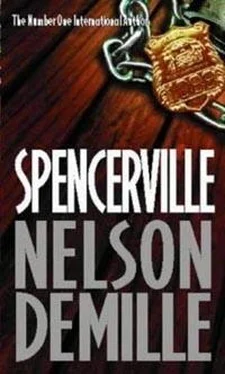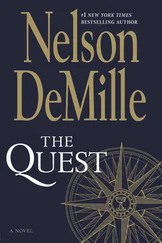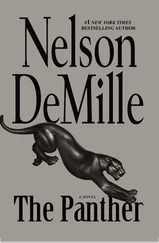"About the return of the prodigal son?"
"I had something else in mind, Mr. Landry."
"I may be out of town next Sunday."
Wilkes smiled mischievously. "Pity. I was going to discuss the role of the church in public affairs."
"Good topic. Perhaps you could send me a copy of it."
"I will."
They shook hands again, and Keith moved off. It was a cool, blustery morning, and a north wind blew through the cornfields and the trees, scattering the first leaves of autumn over the grass and through the tombstones of the churchyard. It was a starkly beautiful day, the white church and parsonage, the tall swaying elms, the picket fence of the cemetery, the clouds sailing across a pewter-colored sky. But there was something foreboding about it, Keith thought, something portentous about the autumn wind that blew the summer away and turned the land into hues of red and gold, which were deceptively pleasant harbingers of the dark season. As much as he wanted to stay, he was somehow glad he wouldn't be here much longer.
Keith ran into his aunt in the parking field, and she told him how pleased she was that he'd come to church, then invited him to Sunday dinner. Unable to think of a polite way to refuse — except to say that he'd rather watch the Redskins game and drink beer, which she wouldn't think was polite — he accepted.
* * *
At the appointed hour, around kickoff time, he arrived at Aunt Betty's with a bottle of French red Burgundy. Aunt Betty studied the label awhile, mouthing the French words, then put the bottle in the refrigerator. It didn't matter, because as it turned out, she didn't own a corkscrew anyway, and Keith sat in the living room with a glass of caffeine-free instant iced tea with too much sugar in it.
Also invited to dinner were some of the people he'd seen at the Labor Day barbecue — his mother's other cousin, Zack Hoffmann, and Zack's wife, Harriet, and their grown daughter, Lilly, and Lilly's husband, Fred. With Lilly and Fred were their three young boys, whose names Keith didn't catch and who were too young to demand that the Redskins-Cleveland game be turned on. The boys went outside and played in the yard.
Keith made small talk, aware that these people were related, and kept the conversation going by playing the family-tree game. Keith actually found it interesting in some essential, tribal way.
At dinner, which was traditional roast beef, gravy, mashed potatoes, peas, and biscuits — the sort of American food that had disappeared from the nation's capital two decades ago — Harriet, still on the family-tree subject, mentioned, "My sister, Dorothy, married Luke Prentis. I think you know the Prentis family, Keith."
He looked at her and remembered why she looked familiar.
"I believe you once went out with my niece, Annie."
"Yes."
"She married one of the Baxter boys. Cliff. He's chief of police."
Keith wondered if he could open the wine bottle with a screwdriver.
Zack looked up from his roast beef and said, "I heard they had a meeting about Cliff Baxter at St. James. That fella is a..." He glanced at the boys and said, "... is a wild one, if you want my opinion."
Lilly and Fred agreed. Aunt Betty was oblivious, and the boys asked permission to be excused, which was granted.
Zack watched them go, then leaned forward and said in a conspiratorial tone, "I heard he fooled around. They had some woman up there in the church, and brazen as can be she told everybody she and Cliff Baxter was up to somethin'."
Aunt Betty asked, "Does anyone want seconds?"
Harriet turned to Keith and asked him, "Have you seen Annie since college?"
"No."
Fred said, "I hear there was another woman up there, Mary Aries, and she and her husband, Bob, own that gas station on 22, and she told how Cliff Baxter would help himself to things in their convenience store, then make her put the charge on the town gas bill."
Harriet said, "My sister was at that meeting, and what she heard about her son-in-law's fooling around made her sick." She looked at Keith.
Keith listened to the conversation, noting that Fred and Zack were more concerned about the police chief's financial misdeeds than his marital transgressions, while Lilly and Harriet were fixated on the sanctity of marriage.
Lilly said, "If I heard that my husband was fooling around, I'd kick him out without another thought."
Fred didn't look like the type who would or could fool around, Keith thought, but having been forewarned, he looked almost chastised.
Aunt Betty said, "There's plenty more in the kitchen."
Harriet said to Keith, "I wouldn't be surprised if she walked out on him."
"Who?"
"Annie."
"Oh... right. The spouse is usually the last to know."
"My niece is a saint," Harriet said. "She raised two fine children and keeps that house like a showcase for him. She deserves better."
Lilly said to her mother, "Someone should let her know, in case she doesn't know. If it was my husband doing that, and no one told me, they wouldn't be my friend, I'll tell you that." She looked at Fred, whom Keith was beginning to suspect of adultery.
Harriet came to the defense of her son-in-law and said, "Fred wouldn't even think of fooling around."
People liked the topic of adultery, Keith had discovered, here or in Washington, Rome, Paris, Moscow, everywhere. But as interesting as it was in the abstract, or in specific cases at hand, it always got touchy and too close for comfort, and so, though everyone at that table was free of sin — except for himself — the topic was dropped. Harriet said to Keith, "I'll tell Annie I saw you. I'm sure she'd tell me to say hello to you."
"Thank you. Please send her my best regards."
"I certainly will. Maybe you'll run into her someday."
"You never know." Keith made a mental note to tell Annie to send Harriet a postcard from Rome.
Aunt Betty announced, "We have lime gelatin with marshmallows for dessert. Does anyone want coffee? I have instant, decaffeinated. I can boil water."
Keith stood. "I hate to eat and run, Aunt Betty, but I promised someone I'd meet them at five."
"It's only a quarter to. Have some dessert first."
Keith recalled that Aunt Betty always had some problems with chronological reasoning, so he said, "I like to drive slow. Thank you, it was a terrific meal." He kissed her and shook hands all around, saying to Fred, "Stay out of trouble," and to Harriet, "My best regards to your sister and to Mr. Prentis."
"They'll be thrilled."
"I hope so."
He left, said goodbye to the boys, who were throwing a football around, and got into his car.
On the way home, he replayed parts of the conversation. What interested him was not what was said about Cliff Baxter, or Annie Baxter, but that good old Harriet was playing Cupid. Keith laughed. There were people, he thought, who, no matter how old they were or how they were raised, had romance in their hearts. Poor Lilly and Fred had no spark of it and probably never did, and neither did Aunt Betty. But old Zack and Harriet still looked at each other with a gleam in their eyes. Lovers, Keith decided, were special people, and all lovers recognized other lovers, so he knew that Harriet heard his heart beat every time she mentioned Annie.
* * *
The next three days, Monday to Wednesday, Keith spent at home. He did not want to risk even one foray away from the farm, not one incident or confrontation with Baxter or his men. He was too close to the goal line, to use football analogy, the clock was ticking, and it was no time for anything fancy or risky. The last play would be a running play.
Although he was safely within the confines of his own home, and under the law he was king in his own castle, he had another concern. While he couldn't imagine that Baxter could present a judge with any reason to approve a phone tap, it had occurred to him that Baxter might put a tap on the line anyway. One of the standard gadgets in Keith's briefcase was a bug alert which he'd never thought he'd use again, but he had swept the house with it a few times, discovering nothing. He also checked the inside phone connection in the cellar every time he left the house and returned. There was a device to detect a telephone pole line tap, but he didn't have the device in his bag of tricks. Another possibility was a directional microphone aimed at his house, but he could see for a mile in any direction from his second-floor window, and he never saw a vehicle parked for a long time. He doubted if the Spencerville police had any high-tech eavesdropping devices anyway. But you never knew.
Читать дальше












